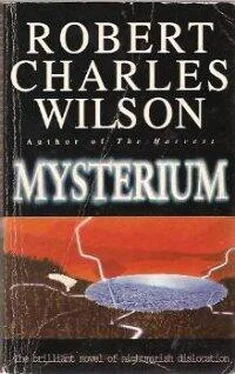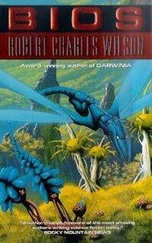He took another step and another, though his stomach was churning. There was a turbulence all around him. The air itself seemed to solidify and take form, as if translucent bodies were moving through it. More ghosts, he supposed. Maybe they really were ghosts, the restless remains of the men and women who had died in these bunkers the night of the explosion.
But Howard doubted it. There was something purposive in the way they crossed his path, circling the laboratory buildings as if they were trapped here, and perhaps they were: maybe these were the creators of the fragment, still attached to it, orbiting it a helpless half step out of time.
He shook his head. Too much speculation: that had been Stern’s downfall.
Stern, who was calling him onward. Set aside the rationalization and that was why he was here: Stern had called him. And Stern was calling him yet.
∞
You might be as smart as your uncle, Howard’s mother used to say. It was a compliment, a suspicion, a fear.
Stern had always loomed over him like a monument, stony and unapproachable. In Howard’s family no-one talked much about the important things. But Stern always came with a baggage of big ideas and he always shared them with Howard. Teased him with them: You like this morsel? Then how about this? And this?
Howard remembered his uncle leaning forward from the cane chair on the porch, on a summer evening alight with stars and fireflies, his voice obscuring the faint rattle of china dishes on a faraway table: “Your dog sees the same world we do, Howard. Your dog sees those stars. But we know what they are. Because we can ask the right questions. And that’s knowledge the dog can never share. By his nature: never. So, then, Howard—do you suppose there are questions even we can’t ask?”
∞
Fireflies here, too: sparks in his vision.
He was approaching the central building. Its roof had collapsed, but the concrete-block frame was intact. A crack ran through the steel door. On closer inspection, the brickwork was filleted with jewels; diamonds clung like barnacles to every wall. There was something seductive about these faceted surfaces and Howard was careful not to stare too long. There were other horizons here, not his own.
He touched the door. It was hot. This was real heat, and he was probably close enough to the core event that he was being bathed with real radiation. Enough to kill him, probably, but that was of no concern any longer.
He had used the word awestruck in the past without knowing what it meant, but now he understood it. He was stricken by awe, consumed by it; it obliterated even his fear.
This was the place where his uncle had crossed the border of the world.
∞
If Stern had brought them all here, did that make Stern a Demiurge?
Had he found this world or actually made it? Constructed it, consciously or unconsciously, with the aid of the Turkish fragment, from his own fears and hopes?
If so… then, like Sophia, he had made an imperfect thing.
Everything he had wanted from his ancient books, a key to the pain and the longing he felt, a cosmogony beyond physics, here in the world of the Proctors it was all transmuted into something base: a lifeless dogma. Everything noble in it had grown calcified and oppressive.
Maybe Stern was lost, Howard thought. Trapped in his own creation and helpless to redeem it. Am I prepared to face a god? He shuddered at the thought. But he opened the cracked and jeweled door.
With daylight, the town surrendered to panic.
Fire broke out in the Beacon Street business district and there was no one to control it; Tom Stubbs had headed west, along with most of the Volunteer Fire Department. Flames swept through the Emily Dee Large-Size Fashion Shop, the New Day Bookstore, and an empty corner property with boarded windows on which the faint words COMING SOON! ANOTHER FRY CASTLE FAMILY RESTAURANT were still faintly legible.
Refugees approaching Coldwater Road encountered a roadblock manned by a detachment of soldiers—word of the escape attempt had leaked—but the lead cars, including Calvin Shepperd’s, each carried three sharpshooters and the cream of Virgil Wilson’s collection of semiautomatic rifles. The gunfire began before dawn and continued sporadically through the morning.
Three truckloads of soldiers, turned back from the road to Fort LeDuc by steel gabions and a skirmish line of tanks, passed through town at high speed.
One truck made it nearly to Coldwater Road before a rear guard of armed civilians caught it in a crossfire. The driver was killed instantly and spared the knowledge that his last act had been to steer the vehicle over a barricade and down a vertical embankment into the shallow ice of Powell Creek.
The second truck headed north in a vain attempt to cross the firebreak and reach safety; it broke an axle in a snowy hydroelectric right-of-way. Twenty-five soldiers without winter clothes or adequate supplies formed a line and marched into the dark woods, hoping to outrun the angel Tartarouchis.
The third truck turned over in front of City Hall, spilling a cargo of angry draftees who fanned out and began to empty their rifles into the unblinking facades of these alien houses, in this town on the edge of the Abyss, this Temple of Grief.
∞
Dex started a turn onto Municipal Avenue when he saw the soldiers among the trees on the City Hall promenade—and the soldiers saw him.
Taken by surprise, he twisted the steering wheel hard right. The road surface was too slick for traction. The car slid at a skewed angle toward the sidewalk and Dex fought to keep the wheels out of a drainage ditch. Something pinged from the hood: he saw the new dent and a gleam of steel where the paint had been scoured by a bullet.
He told Linneth to get down. “And keep her down, too!”—Ellen Stockton, who was gawking at the soldiers with boozy incomprehension.
The car stopped shy of the ditch. Dex threw it into reverse and stepped on the gas with as much restraint as he could muster—but the wheels only raced on a slick of compressed snow.
He worked the gear shift, rocking the car forward and back. When he spared a glance down the street he saw a soldier maybe a hundred yards away—a kid, it looked like, barely voting age, aiming a big blue-barreled rifle at him. It was a mesmerizing sight. The soldier’s aim wobbled and then seemed to steady. Dex hunkered down and goosed the gas pedal again.
A bullet popped two of their windows—back seat, left and right. The safety glass fell away in a rain of white powder. Linneth emitted a stilled scream. Dex stomped the accelerator; the car roared and leaped forward in a cloud of blue exhaust.
He worked the vehicle into a turn and steered away from the soldiers. He heard more bullets strike the trunk and bumper, harmless pings and thunks —unless one of them happened to find the gas tank.
He steered left on Oak, still fighting the wheel. The car danced but moved approximately north.
He was two blocks gone and around another corner before he dared slow down.
“Christ Jesus!” Ellen Stockton said suddenly, as if all this had only just registered. “ What are they doing to Cliffy!”
“It’s all right, Mrs. Stockton,” Dex said. He looked at Linneth. She was pale with anxiety, but she nodded at him. “They don’t seem to have any particular interest in the municipal building. We’ll just have to go in from the back.”
Time was a precious commodity, and worse, there was no way to know exactly how precious it really was. Nevertheless, he waited in the car until the sound of the soldiers’ sporadic gunfire had moved away.
Читать дальше












